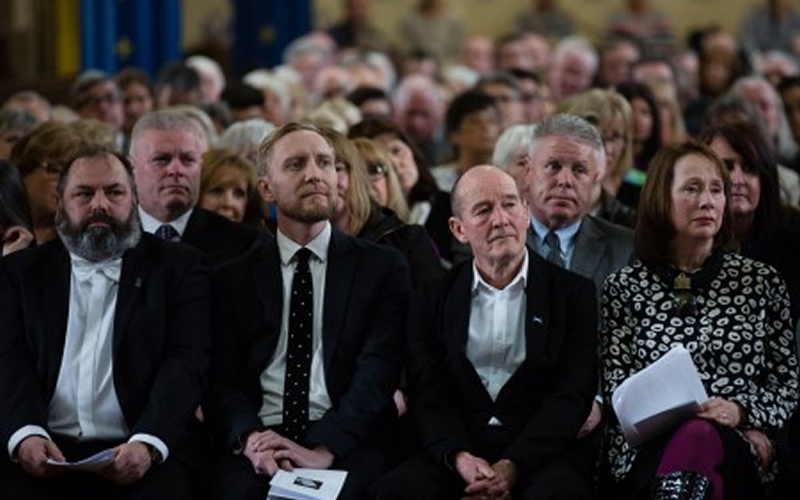THERE is a voice nagging in my head at the moment. Its familiarity is comforting though its absence beyond my napper is deeply vexing. But it says: “For God’s sake, Hughie, let them away for a hauf.”
In memory of Willie McIlvanney, I will thus be brief. I will also, almost in tribute, stray somewhat from my brief of talking about Willie’s journalism.
Willie, after all, was known to take a commission as a mere suggestion. The eloquence and artistry of this afternoon will thus be replaced here by a message of some crudity but, forgive me, I believe that Willie’s greatness, his genius, his significance deserves countless affirmations. This is just one. Better will follow this afternoon and beyond but if this falls short in quality it will take on anyone in terms of sincerity.
I first came across Willie in a journalistic setting some 40 years ago. A senior editor dumped a manuscript on a desk in the Glasgow Herald. “We are serialising this. And you are subbing it,” he said. It was Laidlaw. Thankfully, my subbing was restricted to reading it and checking that the proofs chimed with the genius.
It is impossible to relate the level of excitement I experienced as I read through it. After all, I had read a book before. And read once since. But this was special, not just in its pace, humour and depth. It was close to home in every sense. Willie’s writing made me proud. In the parlance of my day job as a sportswriter, he was world class. Every city, town, hamlet and collection of huts, breezeblock or mud, has certain compulsory professions: there is the football manager, the comedian, the story teller. It is astonishing to me that three of the greatest exponents in these vastly differing disciplines – Sir Alex Ferguson, Billy Connolly and Willie – should not only be Scottish but know each other, have enjoyed a drink together, been friends.
It is less remarkable, of course, that Willie complemented his novels, his poetry with journalism. It was and is predictable he was brilliant, winning awards, and gracing the pages of the Glasgow Herald, Scotland on Sunday and the Observer Scotland, among many others. His journalism was never a distant cousin to the fiction because Willie employed newspapers as merely the stage to say what he wanted to say.
If fiction offered him the licence to examine how we attempt to live, to be good in the face of evil, to beat on boats against the current, to accept and need the restorative warmth of love, then newspapers gave Willie the scope to say much of the same though its putative subjects could be the demise of Ravenscraig, the perfidy of politicians, the occasional triumphs and regular failures of our footballers, and the significance of Oscar Mazaroli.
He was akin to Dickens and Balzac in writing about a place and its people, whether for fiction or for newspaper. There may be those who say this hyperbole. Here’s a word of advice. Just don’t say it to me. Or to the great writers who revered him. Or to the people who would accost Willie in pub, street or even crematorium to tell him how important he was to them.
This affection was enhanced by Willie’s graciousness. But it existed because he was a writer who articulated concerns, thoughts and sentiments that his audience both recognised and found central to their lives.
This is art. In the manner of his hero Montaigne, Willie never told us how to live but examined how we did so, sometimes with the trace of that handsome smile because, of course, he was very, very funny but sometimes with more than a hint of anger that reminded one that if you were in the business of taking liberties then his shop was shut.
His greatness as an author seems to me to have been understated. And here is the crude message: he is in the front rank in global terms. In my stint as literary editor of The Herald, I was gratified but not surprised to be constantly reminded this was a view that was not solely that of that callow sub-editor facing Laidlaw almost 40 years ago.
George V Higgins, the best Boston writer not called Henry James, said he was inspired by Willie. Others routinely but sincerely praised him. A couple of years ago, too, a publisher phoned me from New York asking if he could use an interview I had conducted with Willie as part of a publicity drive for an imprint of European noir. This stable included serious thoroughbreds such as Manuel Vasquez Montalban and Jean Claude Izzo.
How important was Willie to the imprint, I asked. “Totally,” said the publisher. “If we did not have him we would have lost credibility.” That credibility, that profound importance endures. And so does that voice in my head. It is telling me to shut up before the bar closes.
Hugh MacDonald
From the William McIlvanney Memorial Service, 2nd April 2016
|



